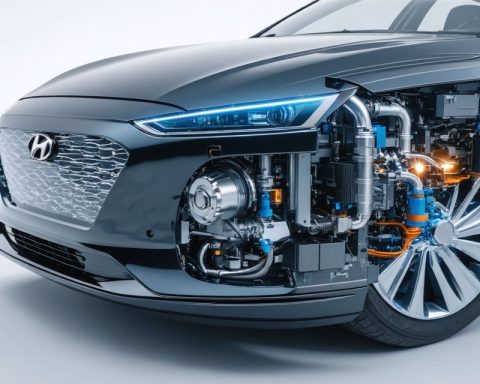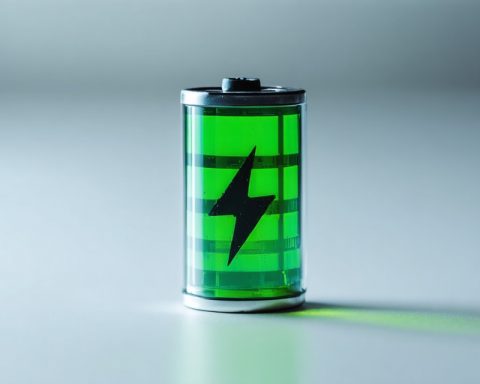- Akasol, a leader in lithium-ion battery systems, plans to close its facilities in Hazel Park and Warren, Michigan, affecting 188 workers.
- The operations will consolidate in Seneca, South Carolina, as part of Akasol’s strategy to streamline production.
- The closures highlight the dynamic nature of global markets, necessitating adaptation and evolution for business survival.
- The decision complies with the Worker Adjustment and Retraining Notification (WARN) Act of 1988, ensuring officials are informed of job losses.
- The local economy faces potential challenges due to the loss of jobs and community disruptions.
- This development underscores a broader industrial lesson: the importance of continual evolution amidst technological and market changes.
- Change remains a constant, driving innovation and impacting lives and industries worldwide.
Electric dreams encounter a harsh reality as a sweeping move takes the spotlight in Michigan’s industrial townships. Akasol, a trailblazer in lithium-ion battery systems, announces plans to shutter its two facilities in Hazel Park and Warren, curtains finally drawing on April 14. The din of assembly lines will silence, and with it, a community of 188 skilled workers faces an uncertain future.
Picture this: high-performance battery packs are vital to propelling the electric vehicle revolution. Yet, like dominoes, these Michigan outposts fall, their operations migrating to a single, consolidated hub nestled in Seneca, South Carolina. This strategic pivot underscores Akasol’s master plan to streamline battery production, a vivid example of businesses constantly adapting to the relentless march of global markets.
For those left in the wake, the closure arrives not as a whisper but a thunderbolt, uprooting livelihoods and shaking the local economy. In well-preserved bureaucratic etiquette, Akasol alerted both Hazel Park and Warren officials of the impending job losses, complying with the Worker Adjustment and Retraining Notification (WARN) Act of 1988.
While the hard-working fabric of these communities braces for the closure’s economic tremors, the industry at large might glean a sobering lesson: to survive, adaptation is non-negotiable. In a landscape marked by rapid technological shifts and competitive hustles, businesses must continually evolve—or risk becoming relics of a bygone era.
As the dust settles, a stark yet essential reminder emerges: change is the only constant in the industrial saga. Whether it breathes innovation or despair, it undeniably reshapes the lives and landscapes involved.
How Michigan’s Battery Plant Closures Reflect Broader Industry Trends
Understanding the Closure: Challenges and Strategic Shifts
The announcement of Akasol closing its Michigan facilities in Hazel Park and Warren reflects a significant shift in how companies in the electric vehicle (EV) industry are restructuring to maintain competitiveness. This decision to relocate operations to Seneca, South Carolina, illustrates broader trends within the industry, such as consolidation to achieve greater efficiency and scalability, factors crucial for long-term success in the rapidly evolving market of electric mobility.
How-To Steps & Life Hacks: Navigating Industry Change
1. Stay Informed: For workers facing displacement, staying updated on industry trends is vital. Resources like Wall Street Journal and Bloomberg provide insights on market dynamics.
2. Reskilling and Upskilling: Consider taking online courses offered by platforms like Coursera or Udacity to improve habilidades in emerging technologies relevant to current job market needs.
3. Network and Connect: Joining industry forums and LinkedIn groups can provide networking opportunities and expose individuals to potential job openings and collaborations.
Real-World Use Cases: Akasol’s Strategic Realignment
Akasol’s consolidation is not an isolated case but part of a larger trend in the battery manufacturing sector. Companies are focusing on centralizing their operations to reduce costs and improve coordination. This move reflects efforts to:
– Enhance production efficiency by centralizing operations in locations with better logistical support.
– Navigate evolving regulatory landscapes that differ across states.
– Access a skilled workforce that can be trained in cutting-edge battery technologies.
Market Forecasts & Industry Trends
The demand for lithium-ion batteries is expected to grow significantly, driven by the increasing adoption of electric vehicles and renewable energy storage solutions. According to a report from MarketsandMarkets, the global lithium-ion battery market is projected to reach USD 129 billion by 2027. Companies are likely to continue prioritizing:
– R&D investments for technological advancements.
– Strategic partnerships to optimize supply chains.
– Integration with renewable energy applications.
Security & Sustainability: Addressing Concerns
With battery production comes an increased focus on sustainability and security, including:
– Developing recycling methods to manage battery waste.
– Ensuring supply chain security for critical raw materials, reducing dependency on specific regions.
– Implementing eco-friendly manufacturing processes to minimize environmental impact.
Pros & Cons Overview
Pros:
– Centralized operations can lead to reduced operational costs.
– Enhanced ability to invest in new technologies and scale production efficiently.
Cons:
– Job losses in original locations may disrupt local economies.
– Potential logistical challenges associated with consolidating operations can arise.
Actionable Recommendations
For affected workers, consider the following quick tips:
– Engage in career transition services offered by local job centers.
– Seek guidance from industry-specific career coaches specializing in tech and manufacturing.
– Explore relocation opportunities if feasible, especially in emerging markets tied to EV technologies.
In conclusion, while Akasol’s facility closures in Michigan highlight adaptation imperatives within the battery industry, they also underscore the broader economic implications of such shifts. Those affected should leverage available resources and training programs to prepare for future opportunities in the ever-evolving landscape of green technology.







